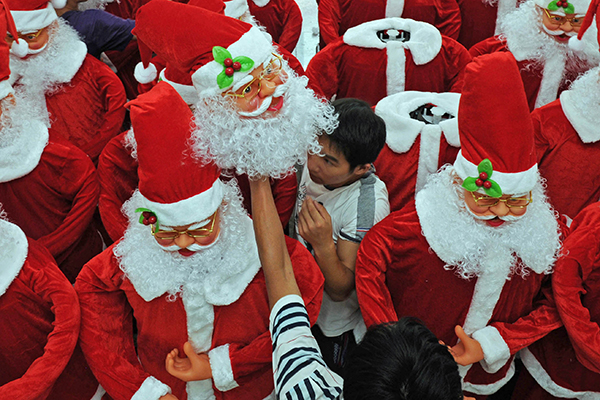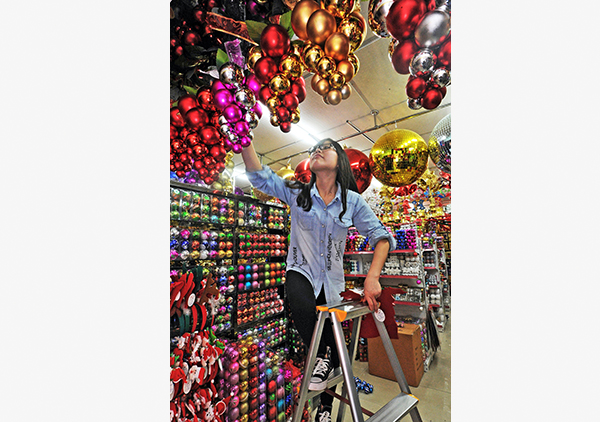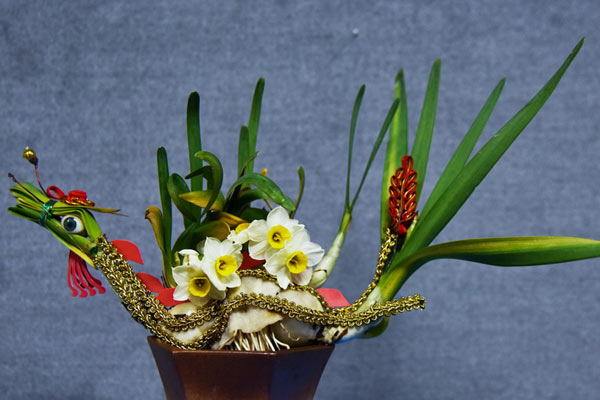Ho ho ho, market's right here!
 |
|
Workers prepare Santa Claus costumes in Yiwu, Zhejiang province. Yiwu is the largest Christmas goods production and export base in the world. [Photo/Xinhua] |
Local companies selling Christmas decorative goods shift focus from exports to China
Christmas is helping some Chinese companies to have an extended sales season that has been starting on Nov 11-Singles Day online shopping festival-for several years now.
What's more, China-based makers of decoration items, which hitherto relied on exports, are finding new Christmas-time sales opportunities in the domestic market.
In fact, Yiwu Xiying Trade Co Ltd has been attaching more importance to the domestic market than exports in recent years, said Liu Peng, manager of its e-commerce department.
That's a radical shift from the situation five years ago, when 90 percent of the company's Christmas-related products were sold in overseas markets. Now, 50 percent of the products-a 2.5-meter Christmas light chain (48 yuan or $6.90), a 1.5-meter Christmas tree (199 yuan), a wreath (65 yuan), a pine cone (4 yuan) and such-are sold in China.
There are several reasons as to why the domestic market has warmed to the Merry Christmas idea, which is essentially a Western modern cultural construct.
Commercial establishments like malls, hypermarts, cinemas and restaurants ring in the festive cheer by draping themselves with all sorts of China-made Christmas paraphernalia, and by playing carols, songs and Western music in the background.
 |
|
A saleswoman displays Christmas goods at the small commodities market in Yiwu, Zhejiang province. [Photo/Xinhua] |
That helps extend the shopping season into the New Year and boosts sales, including those of Christmas goods at the consumer level.
For Chinese consumers, especially university students, single working professionals and young families with kids, Christmas is not a religious festival but an opportunity to brighten up homes during the smoggy, dull, bitterly cold winter with bright, colorful, mood-elevating things.
"There are quite some uncontrollable risks concerning exports. Although it was widely believed that exports will improve this year since the yuan has been depreciating, some other countries are experiencing the same thing (local currency depreciation) or even worse. We have lost one major order from an Egyptian client this year as the local currency-the Egyptian pound-has been depreciating drastically," he said.
For instance, at the beginning of this year, the yuan traded at 6.50 to the US dollar while the Egyptian pound traded at 7.73. On Wednesday, the yuan reached 6.95 while the Egyptian pound settled at 18.85.
Trade between the Chinese company and the Egyptian client is done in US dollars. That meant the Egyptian client would have had to pay $14,000 this year for the same goods it may have bought for $10,000 last year.
Last year, Yiwu Xiying Trade Co's sales revenue was 123,000 yuan ($17,690). This year, it expects the figure to reach 150,000 yuan.
That rise will come despite clients from Europe and the United States still preferring lower-priced traditional Christmas decorations.
Among the export markets, only customers in South Korea lay stress on the creativity of China-made products and are willing to pay more that assures profits for manufacturers.
According to Liu, Chinese consumers are increasingly buying products with better quality, even if they are costlier. Since export items generally tend to be better, the same products are finding new buyers in the domestic markets.
This is translating to higher profits for manufacturers. Last year, Chinese manufacturers sold Christmas decoration items worth 3.6 billion yuan, according to the National Bureau of Statistics. The figure is 2.9 billion yuan for the first 10 months of the year, down 15.9 percent year-on-year, but may rise by the year-end. Typically, profit tends to be 10 percent of sales.
"In the domestic market, a lot of the orders are completed online nowadays. Since major online marketplaces such as Alibaba and JD.com are increasingly tightening product quality control, the prices of Christmas products are higher this year," said Liu.
Liu said Yiwu Xiying Trade Co has been also receiving orders from retail outlets such as department stores, supermarkets and decorative stores in China, all of which are quality-conscious, which helps sustain higher prices.
Chen Jinlin, secretary-general of the Yiwu Christmas Goods Industry Association, said the shift to high-quality, higher-priced products is a good omen for the industry.
Customs statistics show that nearly 60 percent of the global Christmas goods come from Yiwu.
"The city has long been the largest Christmas goods production base in the world. But the fact is, the problem of product homogeneity is quite serious in Yiwu. Only when we have better products and well-known brands can the local companies increase their bargaining power in the global market," said Chen.






















